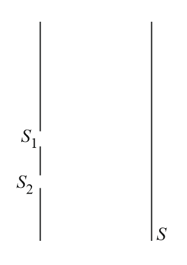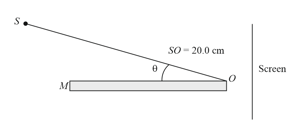Embibe Experts Solutions for Chapter: Wave Optics, Exercise 2: Exercise#2
Embibe Experts Physics Solutions for Exercise - Embibe Experts Solutions for Chapter: Wave Optics, Exercise 2: Exercise#2
Attempt the practice questions on Chapter 10: Wave Optics, Exercise 2: Exercise#2 with hints and solutions to strengthen your understanding. Practice Book for KVPY Aptitude Test - Stream SX Physics solutions are prepared by Experienced Embibe Experts.
Questions from Embibe Experts Solutions for Chapter: Wave Optics, Exercise 2: Exercise#2 with Hints & Solutions
A plane polarised light is passed through successive polarisers which are rotated by with respect to each other in the clockwise direction. Neglecting absorption by the polarisers and given that the first polariser's axis is parallel to the plane of polarisation of the incident light, the intensity of light at the exit of the fifth polariser is closest to,
In Young's double slit set-up, light from a laser source falls on a pair of very narrow slits separated by and bright fringes separated by are observed on a distant screen. If the frequency of the laser light is doubled, what will be the separation of the bright fringes?
In a Young's double-slit experiment, the intensity of light at each slit is . An interference pattern is observed along a direction parallel to the line on screen .

The minimum, maximum and the intensity averaged over the entire screen are, respectively,
An unpolarized beam of light of intensity passes through two linear polarisers making an angle of with respect to each other. The emergent beam will have an intensity,
A beam of mono-energetic electrons, which have been accelerated from rest by a potential , is used to form an interference pattern in a Young's double slit experiment. The electrons are now accelerated by potential . Then, the fringe width,
A monochromatic light source of wavelength is placed slightly above a plane mirror as shown. The image of in can be used as a virtual source to produce interference fringes on the screen. The distance of source from is and the distance of screen from is (figure is not to scale). If the angle, , the width of the interference fringes observed on the screen is,

Two circular linear polarisers are placed coaxially. The transmission axis of the first polariser is from the vertical while the second one is at , both in the clockwise sense. If an unpolarised beam of light of intensity, is incident on this pair of polarisers, then the intensities and transmitted by the first and the second polarisers, respectively, will be close to,
In a Young's double slit experiment, the amplitudes of the two waves incident on the two slits are and . If is the maximum intensity, then the intensity at a spot on the screen where the phase difference between the two interfering waves is is,
